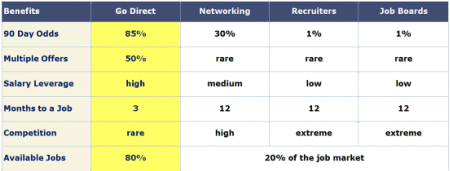
You’ve spent a lot of years in the military and now you’re going to explore your options in the civilian world. You can’t just rely on what you've learned in your Transition GPS/TAP/ETAP/TRS etc.; that just puts you in “the pack” of everyone else who’s looking. An aggressive career plan that will help you get the job you want, where you want to work, is not only possible, it’s essential if you don’t want to be out searching again in a couple years.
Consider this, the late Mark Hovind, former CEO of Job Bait, did extensive research into the job search process and discovered this:
Does this mean that job seekers should just call a company that interests them or show up at their front door? Probably not, but it’s clear that investing time and effort into approaching a hiring manager directly has a far better payoff in long term success than relying on job boards, recruiters, or even networking (which should be well planned and executed). Those approaches can certainly help, but the primary focus should be on the direct approach.
That leads us to the next question. How should a job seeker approach a hiring manager directly? The answer can be found in a number of ways – connecting (and researching) others through social media (LinkedIn, Facebook, Twitter, etc.), informational interviewing, creating “special reports” and proposals to demonstrate your capabilities and to “Brand” yourself as the best qualified job candidate. Very little, if any of this, is covered in Transition GPS, TAP, ETAP, Turbo TAP, TRS, etc. With limited time available and a one-size-fits-all approach, those programs have to deal with the basics of resumes, networking, job interviewing techniques, and other more fundamental issues. That only takes veterans so far and does not fully prepare them for the highly competitive job search environment that they face.
Do you feel fully prepared to capitalize on your military experience in searching for a rewarding career in the civilian world?
by Murray Schrantz - True North Transitions
Consider this, the late Mark Hovind, former CEO of Job Bait, did extensive research into the job search process and discovered this:
Does this mean that job seekers should just call a company that interests them or show up at their front door? Probably not, but it’s clear that investing time and effort into approaching a hiring manager directly has a far better payoff in long term success than relying on job boards, recruiters, or even networking (which should be well planned and executed). Those approaches can certainly help, but the primary focus should be on the direct approach.
That leads us to the next question. How should a job seeker approach a hiring manager directly? The answer can be found in a number of ways – connecting (and researching) others through social media (LinkedIn, Facebook, Twitter, etc.), informational interviewing, creating “special reports” and proposals to demonstrate your capabilities and to “Brand” yourself as the best qualified job candidate. Very little, if any of this, is covered in Transition GPS, TAP, ETAP, Turbo TAP, TRS, etc. With limited time available and a one-size-fits-all approach, those programs have to deal with the basics of resumes, networking, job interviewing techniques, and other more fundamental issues. That only takes veterans so far and does not fully prepare them for the highly competitive job search environment that they face.
Do you feel fully prepared to capitalize on your military experience in searching for a rewarding career in the civilian world?
by Murray Schrantz - True North Transitions
 RSS Feed
RSS Feed